The Top 5 Keto Myths that Most People Believe
With the Ketogenic style of living going mainstream, it is becoming somewhat of a trend. With that, it has obtained a spotlight and different concerns are being expressed. Since emerging from the age of saturated fat and cholesterol condemnation, there is some hesitance to begin a ketogenic diet from many people. To help clarify some things, here are the top 5 keto myths that most people believe.
I am going to break down common objections and explain why the ketogenic lifestyle may be the best thing you can do for your health if done properly.
Ketogenic Diet: What is it?
The ketogenic diet is a nutrition plan that focuses on healthy fats as the primary source of calories. In addition to plenty of healthy fats, the ketogenic diet limits the amount of sugars and carbs consumed to about 5% of total daily calories. Protein takes a moderate 20-30% of total calories each day.
The objective of this way of eating is to steer the body away from the rollercoaster of sugar metabolism and instead turn it into a fat-burning machine. When healthy fats are plentiful and carbs are not, the body will understand that it must shift its metabolism toward burning fat. At this point it will begin using dietary and body fats to produce ketones, a powerful source of energy for the brain and body.
With that being said, there continues to be some misconceptions about this style of eating and how it may (or may not) affect your health.
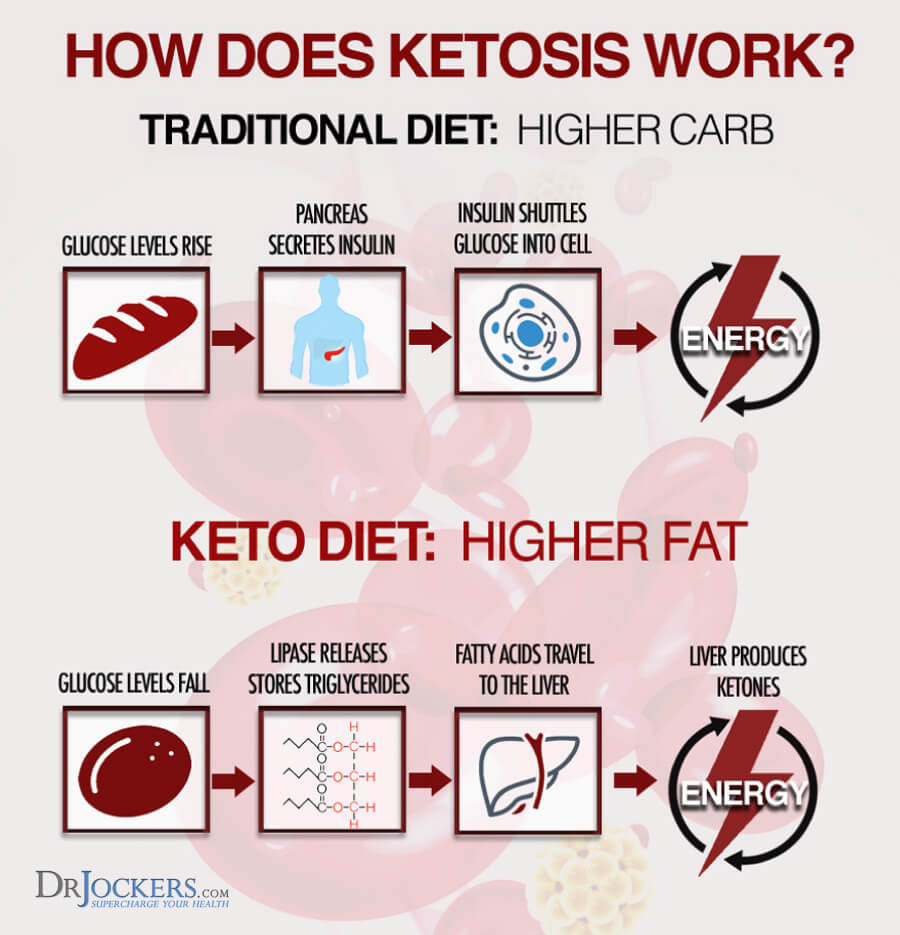
Top 5 Keto Myths
People have a lot of questions about the ketogenic lifestyle. This is great as it is starting to become well-known. I have been using the ketogenic diet in my practice as a therapeutic approach for many years and have had the privilege of tackling these questions. This has helped me better understand the public perception and where different concerns arise.
The following keto myths are some of the most common concerns I encounter. Most of these keto myths are based around an outsiders look at the keto diet and/or a misguided approach to the keto diet and lifestyle. As I go over each keto myth, I highlight strategies you can take to mitigate problems and have a great experience with keto.
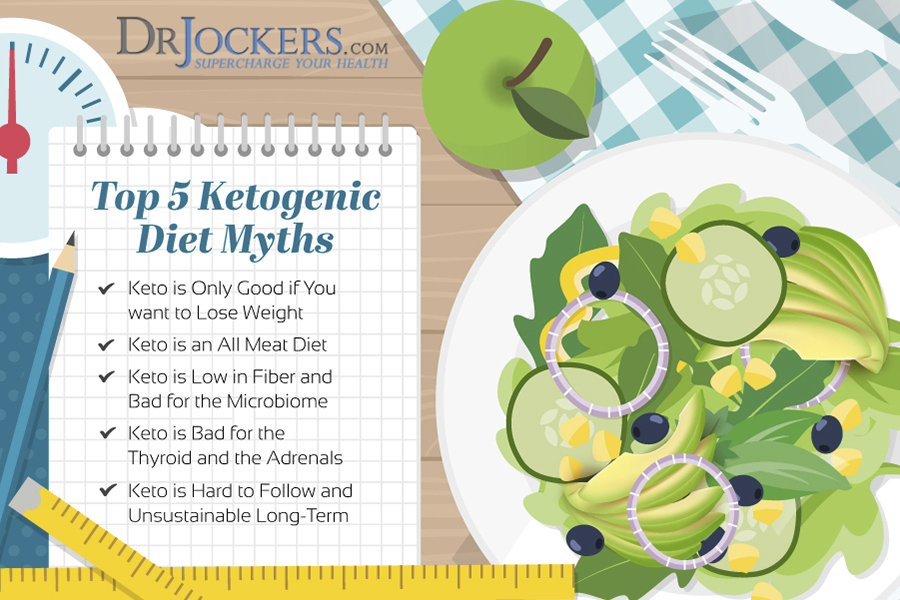
Keto Myths: #1
Only Good for Weight Loss
The most pervasive keto myth is that the Ketogenic diet is only beneficial for people who want to lose weight. Now don’t get me wrong, the ketogenic diet is a powerful way of promoting weight loss, but it can do so much more.
Not only has the ketogenic diet been shown to promote weight loss and help to reverse many of the factors promoting heart disease and metabolic syndromes (1, 2), but have also shown to: (3, 4)
- Drastically cut systemic inflammation
- Reduce cognitive deficits and depressive symptoms associated with neuroinflammation
- Boost energy levels
- Provide relief for inflammatory skin conditions
- Reduce sugar and food cravings
- Increase mitochondrial health (Super Important!)
- Potentially increase lifespan
- … and reduce your risk of several chronic diseases such as: cancer, autoimmunity, neurodegeneration, chronic fatigue, diabetes, and heart disease
This list could potentially be much, much longer. At a foundational level it seems that the benefits of balancing blood sugar, supporting mitochondrial health, lowering inflammation, and turning your body into a fat burning machine just make most processes in the body a little more efficient.
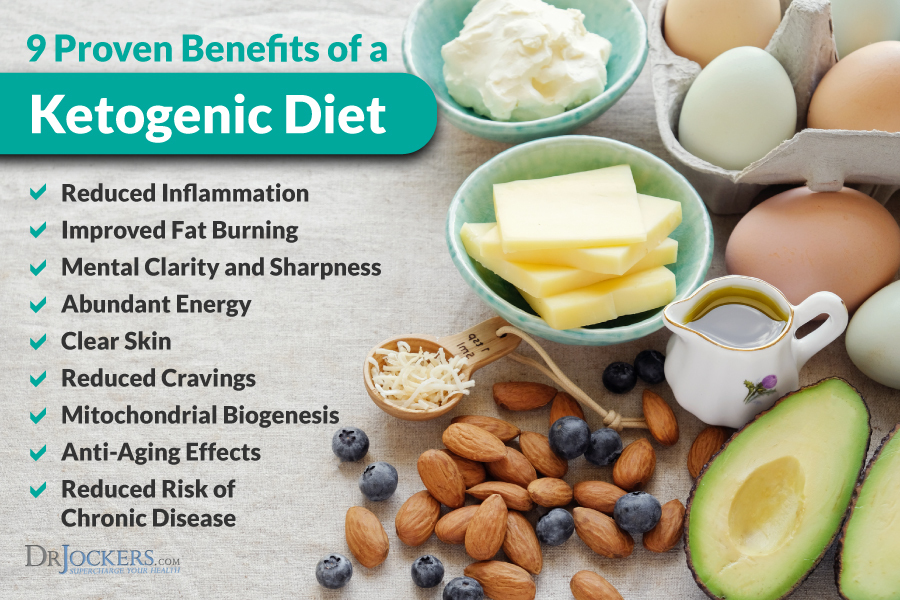
Keto Myths: #2
It is a Meat-Based Diet
Another pretty faulty keto myth is that in order to eat a ketogenic diet, you have to consume lots of meat. This is simply not true. In fact, consuming large amounts of meat is discouraged as this would quickly make protein the primary macronutrient in your diet and prevent an optimal state of ketosis. As was discussed already, healthy fats are the primary source of calories, making up 70-80% of total calories.
These fats can come from coconut products such as oil, milk, flakes, and butter; avocados, olives, grass-fed butter, and a little fat on a grass-fed ribeye steak wouldn’t hurt either. As you can see these sources are, for the most part, plant-based.
My recommendation is generally no more than one serving of meat per day at dinner time. If you would prefer to not consume meat, I have a great guide on following a vegan or plant-based ketogenic diet here: How to Follow a Vegan Ketogenic Diet
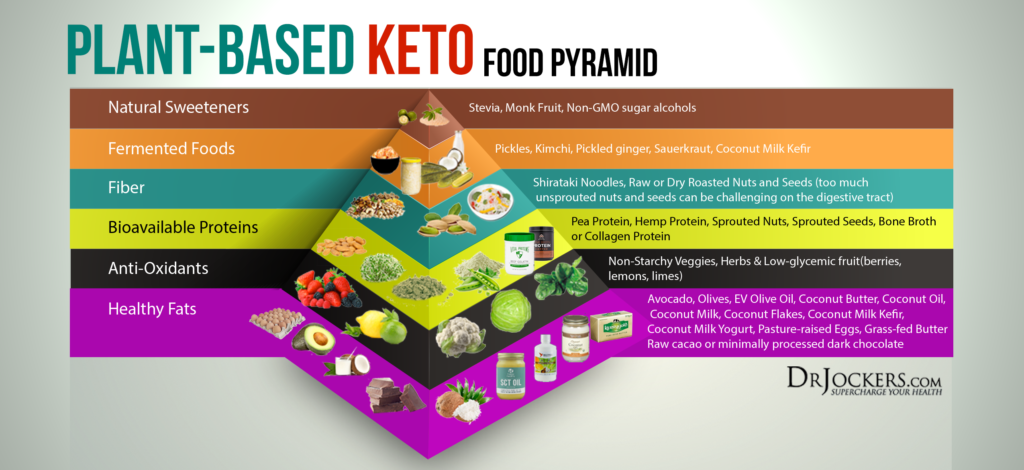
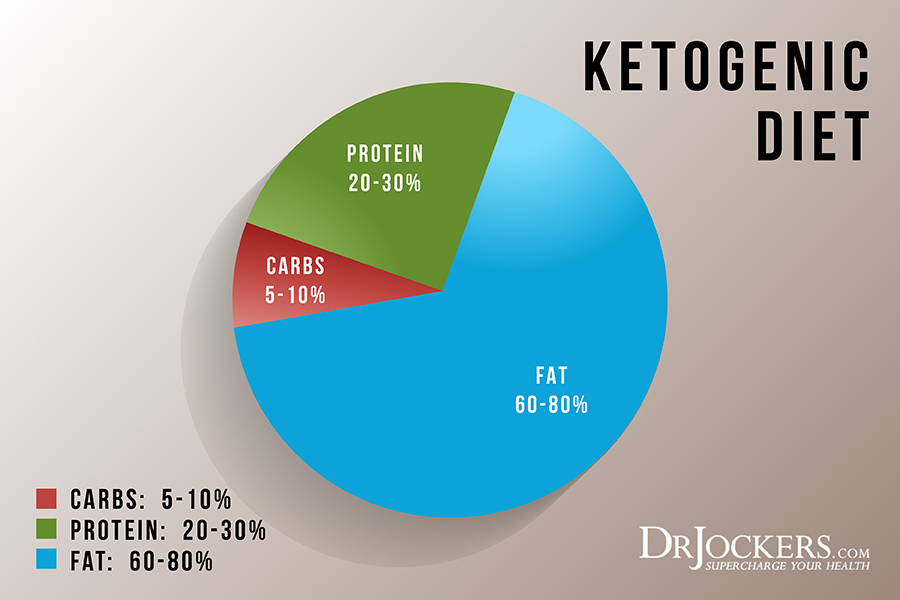
Keto Myths: #3
Low in Fiber, Bad for Microbiome
Maybe this keto myth stems from the idea that keto is a high-meat diet, but some people believe that if they begin this lifestyle, they will not get enough fiber. Obviously, fiber is super important. We need plenty of it to sustain adequate bowel movements and feed the beneficial bacteria in the gut, so this is a legit concern… It just seems completely unfounded.
After healthy fats and moderate amounts of clean protein, the remainder of calories come from low-carb and fibrous veggies like leafy greens, asparagus, Brussels sprouts, artichokes, broccoli, and so much more. In fact, most people who follow a whole-foods ketogenic plan (as I advocate) tend to consume much more fiber than they did on their previous meal plan because increasing vegetable intake becomes a priority (5).
In fact, one of my favorite foods (avocados!) is an excellent source of fiber that is tasty and easy to use in so many ways.
Another thing to consider is that sources of fiber for people consuming a standard diet come from carb sources that feed unwanted microbes in the gut such as candida. The combination of eliminating these carb sources along with plenty of fibrous veggies is fantastic for the microbiome.
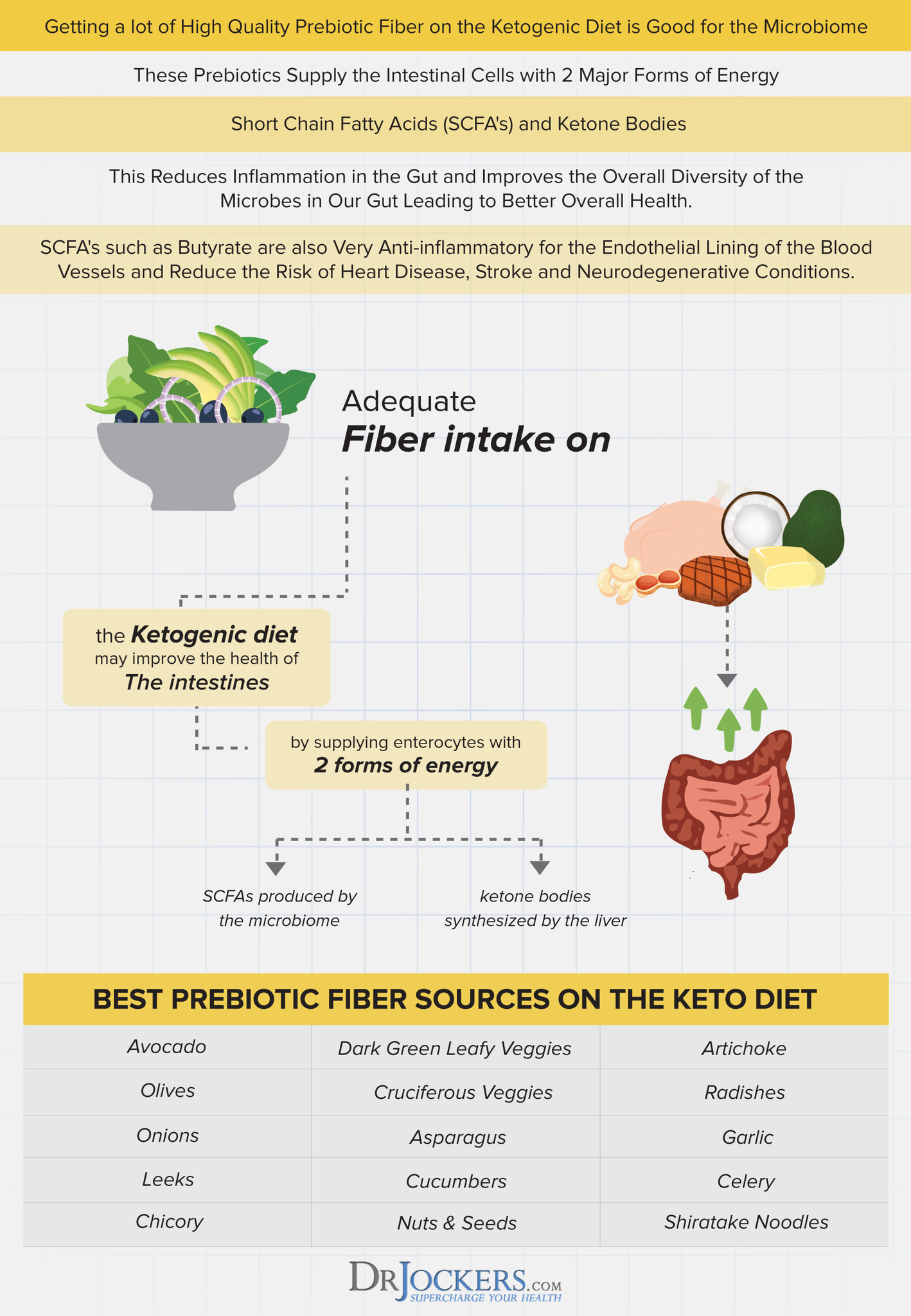
Keto Myths: #4
Bad for Thyroid and Adrenals
The idea that following a ketogenic diet may not be good for those with hypothyroidism or adrenal fatigue has some merit. What I will say though, is that there is a way to integrate ketogenic principles into your nutrition plan that is actually very therapeutic for those with either of these issues. Dispelling this keto myth takes a little bit of nuance so bear with me…
There are a number of reasons why a ketogenic lifestyle can benefit those with thyroid or adrenal issues. The following are some of the primary reasons:
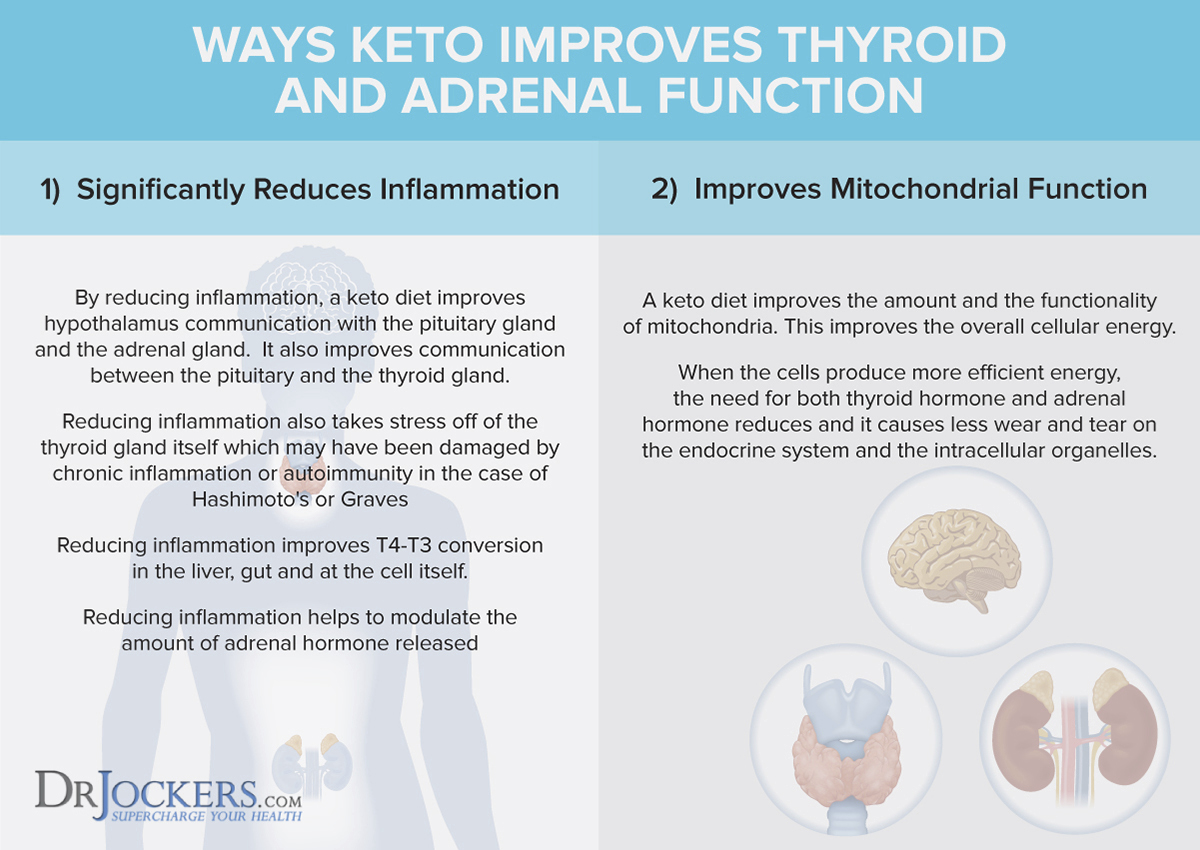
Reducing Chronic Inflammation
Chronic Inflammation is very common in those with either of these issues. It acts as a chronic stressor affecting adrenal function and inhibiting the conversion of thyroid hormone T4 into its active form, T3. As we have discussed, the ketogenic diet is powerful for reducing inflammation and can benefit these conditions in that way.
Now, the beginning stages of a ketogenic diet can be fairly stressful on the body as well. This is why I recommend the following:
- Gradually shift away from a carb-heavy diet using the Keto Metabolic Makeover Phase
- Use carbohydrate cycling to support the Thyroid and Adrenals
- Utilize MCT oils and Exogenous Ketones to reduce the demand of ketone formation
- Utilize Adaptogenic Herbs
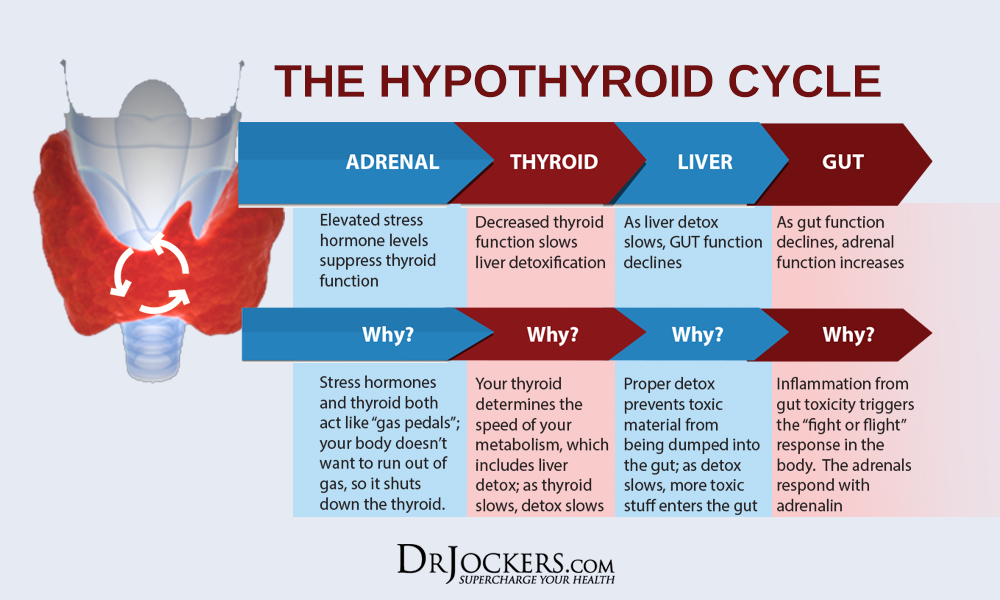
Boosting Mitochondrial Function
Boosting mitochondrial function is huge for improving adrenal and thyroid function. It is common to see that those with adrenal or thyroid issues tend to have poor mitochondrial function as seen on Organic Acids Test results. Time and again, supporting mitochondrial health is one of the most helpful strategies for improving these conditions. When you think about it, this makes perfect sense considering the thyroid and adrenals play a large part in metabolism and energy regulation.
As I mentioned in the previous section, the beginning phases of a ketogenic diet can be somewhat stressful on the body. Your mitochondria receive the brunt of this stress and are forced to adapt. The result is: old and weak mitochondria die off and the formation of new and stronger mitochondria is stimulated. This process is called mitochondrial biogenesis and is excellent news for those with adrenal or thyroid disorders (4).
The key strategies for success here will be following what was just mentioned above while also following these guidelines:
- Consume Enough Calories, hypocaloric diets are highly problematic for the thyroid and adrenals
- Eat on a regular schedule, those with thyroid or adrenal issues will likely want to avoid longer fasts and opt for 3-4 meals per day
- Focus on getting plenty of nutrient-density, especially trace minerals!
- Some cases may benefit from glandular support for the HPA and HPT axis: here
Overall, individuals with preexisting adrenal or thyroid issues may need to cycle out of ketosis more than individuals who do not. When we consume more carbs or protein, our body senses that we are in a state of feasting (food is plentiful) and it drives up thyroid activity, lowers adrenal hormone output. However, if we keep feasting we also drive up insulin and inflammation.
So there is a balance that must be had…where you get the benefits of ketosis while also cycling in carbs once in a while to activate the thyroid. Finding the right schedule for carb-ups is unique and individual to each person, but you can check out my article on a cyclical ketogenic diet here.
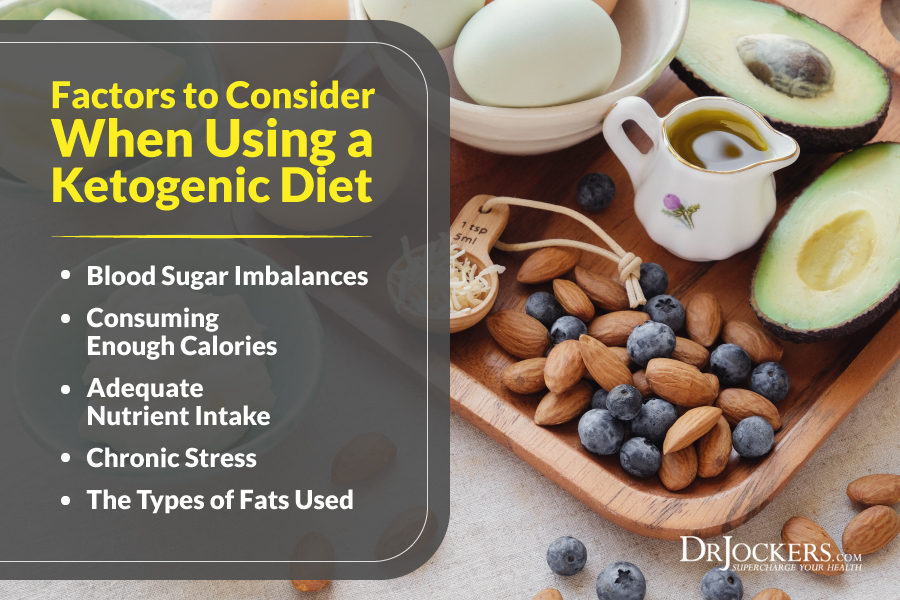
Cyclical Keto For Thyroid and Adrenals
This and many other keto myths are really half-truths in that long-term ketosis could be challenging on some individuals and create more of an imbalance with thyroid and adrenal activity but you can see from above that it also drives down inflammation which is a key to the health of the thyroid and adrenals.
Overall, individuals with preexisting adrenal or thyroid issues may need to cycle out of ketosis more than individuals who do not. When we consume more carbs or protein, our body senses that we are in a state of feasting (food is plentiful) and it drives up thyroid activity, lowers adrenal hormone output. However, if we keep feasting we also drive up insulin and inflammation.
So there is a balance that must be had…where you get the benefits of ketosis while also cycling in carbs once in a while to activate the thyroid. Finding the right schedule for carb-ups is unique and individual to each person, but you can check out my article on a cyclical ketogenic diet here.
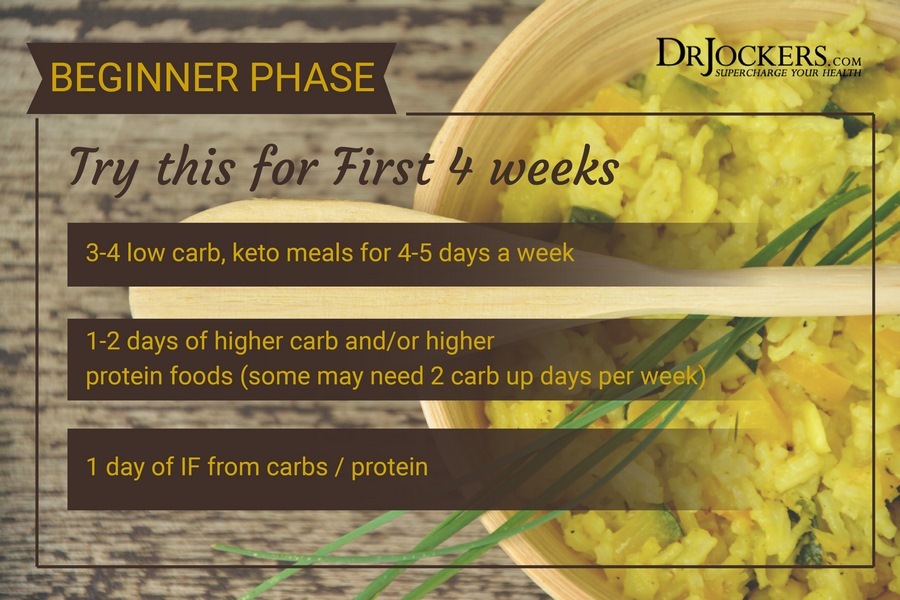
Keto Myths: #5
It is Restrictive & Hard to Follow Long-term
This is one of the common keto myths, which applies to almost any style of eating, is that the ketogenic diet is restrictive and therefore difficult to follow long-term. I do not accept this as a valid reason for not going keto.
If you are accustomed to eating a plethora of processed foods like pastas, breads, high-carb snack foods, etc. I can see where this perception may come from. The reality is, there is a massive list of ketogenic friendly foods that can be used in endless ways.
For example, here are 8 Ways to Use Avocados!
If you are feeling restricted in your food choices, check out this article where I walk you through a typical grocery store and point out the wide variety of foods available to you on a ketogenic lifestyle: Ketogenic Diet Shopping Guide
Additionally, I have an entire online program that walks you through the process of implementing a ketogenic lifestyle that includes a grocery list, recipe book, meal plans, advanced wellness strategies, and other resources to ensure you achieve success. For a preview of this program, click the banner below.
I personally have been living a ketogenic lifestyle for years! I periodically cycle out of ketosis (about 1 day every 1-2 weeks) where I enjoy a higher carb day. People that I have coached on their health journey have also decided to adopt this way of living because simply put, it what makes them feel their best on a consistent basis!
Changing Behaviors is a Mental Game
Finally, I want to offer a new perspective. This idea that a ketogenic diet is restrictive is pervasive in any new way of eating. This is because instead of focusing on all of the new things you get to try, you are fixated on everything you are “not allowed” to have.
Deciding to embark on a ketogenic lifestyle is just like any decision to obtain a goal in life. You are deciding you would like to achieve a goal and you make the necessary behavior changes to ensure that goal comes to fruition.
When you begin to feel like you are missing out on junk foods or whatever it may be, ask yourself these questions:
Are the behaviors I am wanting to perform conducive to the goals I am trying to achieve?
Will I feel more satisfied with myself in the long run if I accomplish my goals or give in to temporary cravings?
Is there a healthier way to satisfy this craving? (we have several keto friendly dessert recipes and, if it is something you miss, keto wine exists!)
Remember: the objective is not to be perfect, this is impossible. The objective is to make way more decisions that are relevant to your goals than are not. This will keep you moving toward your health goals while leaving some wiggle room for enjoying the occasional treat!
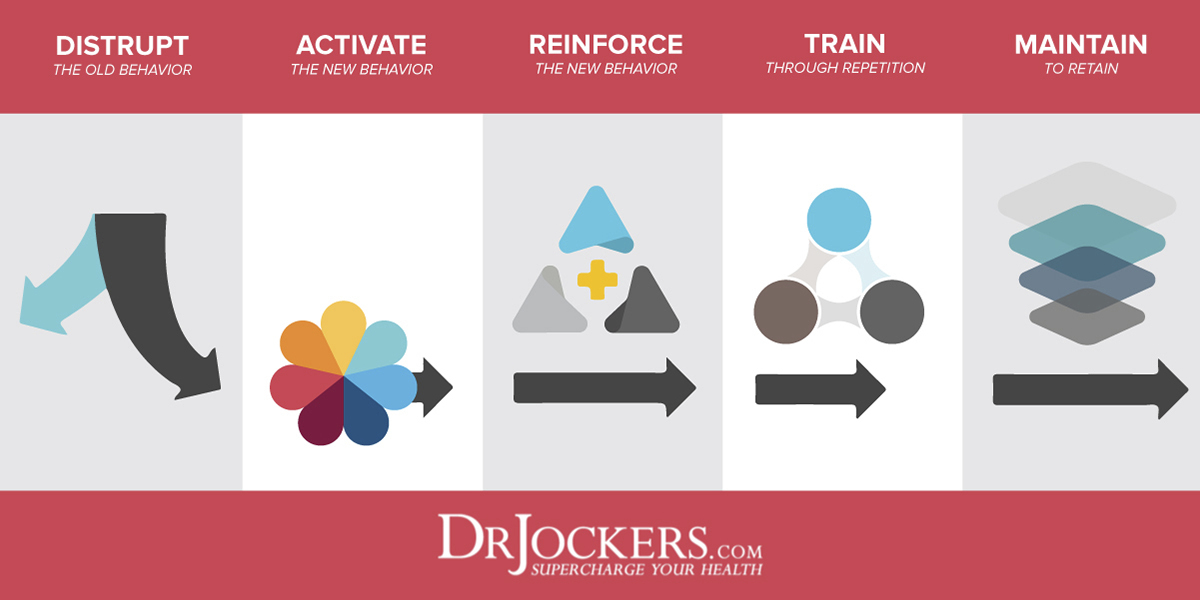
Conclusion
The ketogenic diet is beneficial for so many reasons. Hopefully, dispelling these common keto myths helped to clear your mind and at least help you consider trying it out for yourself.
If you are brand new to the idea of following a ketogenic lifestyle, a Keto Metabolic Makeover is a great way to get your toes wet and begin to get an idea of how this style of eating can help you.

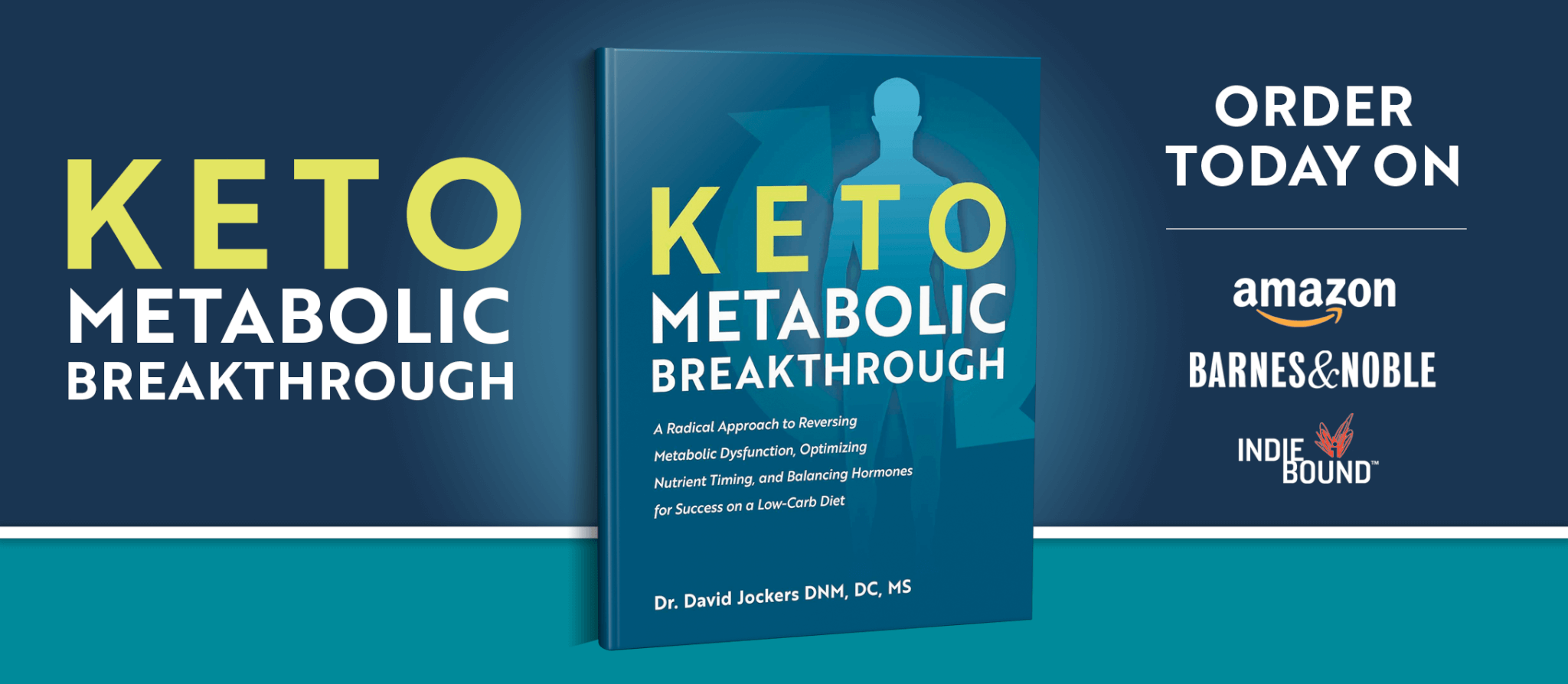




I have an exercise question. You said you do two upper body and two lower body workouts per week. Is it ok to do that and also walk 5 miles each morning and do two HIIT workouts on alternate days…for instance Monday upper, Tuesday lower, Wednesday HIIT, and repeat until Saturday, rest Sunday but also walking everyday too?
That is a relative thing Debbie! I used to workout just about every day but actually feel much better on the 4 day split you just mentioned. For many people I work with, this would be too much, but if you feel like it is energizing to you then theres no problem!
Thanks!
Hey Dr Jockers, do you see international patients via skype ?
Hey Akbar! Yes, my trained health coaches are currently taking on new consults. You can email michael@drjockers.com to get set up!
Your coaches? I thought you would see. I have trust issues with doctors. I read a lot of stuff of yours before I asked you that question.
Unfortunately I am not taking new long-distance consults at this time but my coaches are excellent!
Hi Dr. Jockers,
My husband and I are almost eating a keto diet already with a few exceptions and would really like to try it. However, we have 2 small children and are concerned that it would not be safe/healthy for them to eat this way. How do you advise families, like ours, facing this challenge?
P.S. Our family always eats meals together whenever possible. We strive to cook healthy, nutrient dense whole foods every day.
Hey Connie! You can try doing a cyclic ketognic diet all together where you consume one higher carb meal per week. You could also do carb cycling where only one meal a day is higher in carbs. Finally, you could just follow a low carb diet with them and incorporate a small amount of low glycemic carbs with every meal!
Thank you Dr. Jockers! God bless you for all that you’re doing to help others!